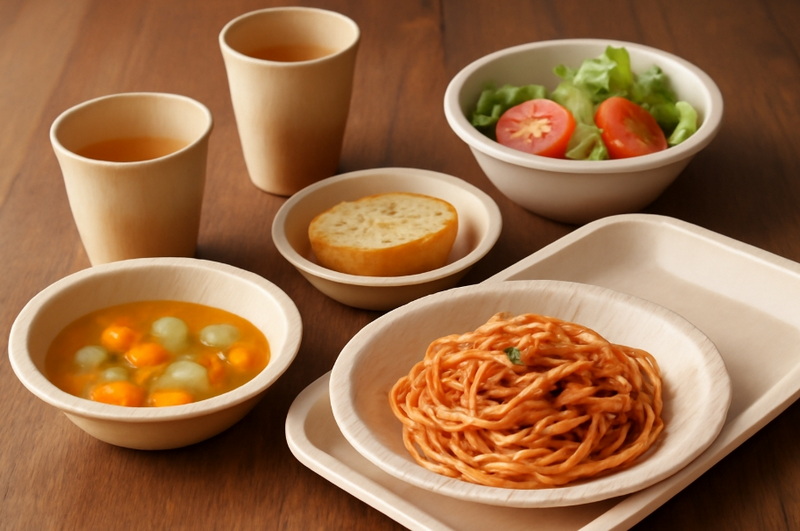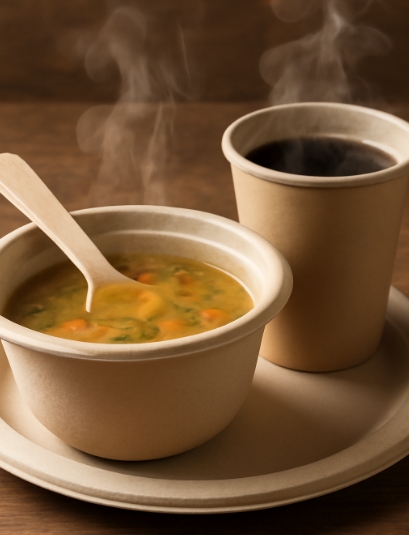
Content Menu
● Understanding Biodegradable Disposable Tableware
>> What Is Biodegradable Disposable Tableware?
>> Common Materials Used
● Heat Resistance and Safety of Biodegradable Tableware
>> How Hot Can Biodegradable Disposable Tableware Get?
>> Safety Considerations
● Durability and Practical Use Cases
>> Everyday Scenarios
>> Limitations
● Environmental Impact and Disposal
>> Composting and Decomposition
>> Proper Disposal Practices
>> Reducing Carbon Footprint
● Choosing the Right Biodegradable Disposable Tableware
>> What to Look For
>> Tips for Best Results
● Innovations and Trends in Biodegradable Tableware
>> Technological Advancements
>> Market Growth
● Social and Economic Benefits
>> Supporting Local Farmers
>> Creating Green Jobs
● Addressing Common Myths
>> Myth 1: Biodegradable Tableware Is Always Compostable at Home
>> Myth 2: Biodegradable Means It Breaks Down Everywhere
>> Myth 3: All Biodegradable Tableware Is the Same
● Conclusion
● Frequently Asked Questions (FAQ)
>> 1. Is biodegradable disposable tableware safe for hot soups and coffee?
>> 2. Can I microwave biodegradable plates?
>> 3. How long does it take for biodegradable disposable tableware to decompose?
>> 4. What certifications should I look for to ensure product safety and compostability?
>> 5. Are biodegradable options more expensive than plastic?
As the world shifts toward greener, more sustainable living, the adoption of biodegradable disposable tableware is on the rise. Whether for home use, catering events, or food businesses, the question remains: Can biodegradable disposable tableware safely handle hot foods and beverages? This comprehensive guide explores the science, benefits, and practicalities of using these eco-friendly alternatives for hot meals, helping you make informed choices that are both safe and sustainable.

Understanding Biodegradable Disposable Tableware
What Is Biodegradable Disposable Tableware?
Biodegradable disposable tableware refers to single-use plates, bowls, cups, cutlery, and trays made from natural, renewable resources. Unlike conventional plastics that persist in the environment for centuries, these products are designed to break down naturally, returning to the earth without leaving harmful residues.
Common Materials Used
- Bamboo: Fast-growing and highly renewable, bamboo offers natural strength, a smooth finish, and resistance to heat.
- Bagasse: This is the fibrous residue left after extracting juice from sugarcane. Bagasse is sturdy, heat-resistant, and composts efficiently.
- Cornstarch (PLA): Polylactic acid derived from corn or other starches is molded into clear or opaque tableware. It is compostable and suitable for moderate heat.
- Wheat Straw: After wheat is harvested, the leftover stalks are processed into durable, lightweight tableware.
- Palm Leaf: Fallen palm leaves are collected, cleaned, and pressed into elegant plates and bowls, offering a rustic look and natural heat resistance.
Each material brings unique qualities in terms of durability, appearance, and heat tolerance.
Heat Resistance and Safety of Biodegradable Tableware
How Hot Can Biodegradable Disposable Tableware Get?
The ability of biodegradable disposable tableware to withstand heat depends largely on its material and manufacturing process.
- Bamboo and Bagasse: Both are known for their high heat resistance. They can typically handle boiling hot foods and liquids without warping or leaching chemicals.
- PLA (Cornstarch): While compostable, PLA softens at temperatures above 90°C (194°F), making it less ideal for boiling soups or piping hot drinks.
- Wheat Straw and Palm Leaf: These materials are suitable for most hot foods, but prolonged exposure to extreme heat may cause slight deformation.
Safety Considerations
Biodegradable disposable tableware is generally safe for hot foods, provided it is certified for food contact and heat resistance. Look for products that meet the following standards:
- ASTM D6400: Ensures compostability and heat tolerance.
- BPI Certification: Indicates compliance with industrial composting requirements.
- FDA Approval: Confirms that materials are food-safe and free from harmful chemicals.
Manufacturers test these products for chemical leaching, structural integrity, and performance under heat, ensuring they are safe for serving hot meals.
Durability and Practical Use Cases
Everyday Scenarios
Biodegradable disposable tableware is designed to balance eco-friendliness with practicality. Here's how it performs in real-world situations:
- Hot Soups and Stews: Bagasse and bamboo bowls retain their shape and strength, even when filled with steaming liquids.
- Grilled and Fried Foods: These plates resist oil and moisture, preventing sogginess and leaks.
- Microwaving: Many biodegradable plates and containers are microwave-safe for reheating, though it's best to avoid extended microwave use to maintain structural integrity.
- Outdoor Events: Sturdy enough for picnics, barbecues, and catering, biodegradable disposable tableware stands up to a variety of hot and cold dishes.
Limitations
- Direct Oven Use: Most biodegradable tableware is not intended for use in conventional ovens or over open flames.
- Long-Term Storage of Hot Foods: While suitable for immediate serving, storing hot foods for extended periods may cause some materials to soften or lose shape.
Environmental Impact and Disposal
Composting and Decomposition
The primary advantage of biodegradable disposable tableware is its environmental friendliness. When disposed of correctly, these products:
- Decompose Quickly: In industrial composting facilities, most biodegradable tableware breaks down within 45–90 days.
- Leave No Toxins: Unlike plastics, they do not release harmful chemicals into the soil or water.
- Support Circular Economy: Made from renewable resources, they help reduce dependence on fossil fuels and promote sustainable agriculture.
Proper Disposal Practices
- Industrial Composting: For fastest decomposition, send used tableware to a commercial composting facility.
- Home Composting: Some products, especially those made from bamboo or palm leaf, will break down in home compost bins, though the process may take longer.
- Landfill Concerns: If sent to landfill, decomposition slows due to lack of oxygen and microbial activity. Proper waste segregation is crucial for maximizing environmental benefits.
Reducing Carbon Footprint
The production of biodegradable disposable tableware typically generates significantly fewer greenhouse gas emissions compared to petroleum-based plastics. By choosing these products, consumers and businesses can make a meaningful contribution to combating climate change.

Choosing the Right Biodegradable Disposable Tableware
What to Look For
When selecting biodegradable disposable tableware for hot foods, consider the following:
- Material: Opt for bagasse, bamboo, or palm leaf for highest heat resistance.
- Certifications: Check for compostability and food safety labels.
- Intended Use: Match the product to your needs-bowls for soups, sturdy plates for entrees, and heat-resistant cups for hot drinks.
- Supplier Reputation: Purchase from reputable brands that transparently disclose their material sources and certifications.
Tips for Best Results
- Avoid Prolonged Exposure to Boiling Liquids: While most products can handle hot foods, avoid letting them sit with boiling liquids for extended periods.
- Store in a Cool, Dry Place: To maintain strength and integrity, keep biodegradable tableware away from moisture and direct sunlight before use.
- Educate Guests or Customers: If using these products at events or in food service, provide clear disposal instructions to maximize composting and recycling.
Innovations and Trends in Biodegradable Tableware
Technological Advancements
The biodegradable disposable tableware industry is rapidly evolving, with new materials and technologies enhancing performance and sustainability:
- Enhanced Coatings: Natural waxes and biodegradable polymers improve water and oil resistance without compromising compostability.
- Hybrid Materials: Blending fibers from different plants creates stronger, more versatile products.
- Design Improvements: Thicker rims, reinforced bases, and ergonomic shapes increase usability for hot foods.
Market Growth
As consumer awareness grows and regulations restrict single-use plastics, demand for biodegradable disposable tableware continues to rise. This increased demand is driving innovation, reducing costs, and making these products more accessible to households and businesses worldwide.
Social and Economic Benefits
Supporting Local Farmers
Many biodegradable disposable tableware products are made from agricultural byproducts, such as bagasse and wheat straw. This not only reduces waste but also provides additional income streams for farmers and rural communities.
Creating Green Jobs
The shift toward sustainable packaging and tableware supports job creation in green manufacturing, recycling, and composting industries, contributing to a more sustainable economy.
Addressing Common Myths
Myth 1: Biodegradable Tableware Is Always Compostable at Home
Not all biodegradable disposable tableware is suitable for home composting. Some require the high temperatures and microbial activity found only in industrial composting facilities. Always check the product label for composting instructions.
Myth 2: Biodegradable Means It Breaks Down Everywhere
Biodegradable tableware needs specific conditions-moisture, oxygen, and microbes-to break down efficiently. In landfills, where these conditions are lacking, decomposition is much slower.
Myth 3: All Biodegradable Tableware Is the Same
There is significant variation in quality, heat resistance, and environmental impact. Choose certified products from reputable suppliers for the best results.
Conclusion
Biodegradable disposable tableware is a safe, practical, and sustainable choice for serving hot foods, provided you select products made from heat-resistant materials like bagasse, bamboo, or palm leaf. These eco-friendly alternatives are designed to withstand high temperatures, resist oil and moisture, and break down efficiently after use, minimizing environmental impact. By choosing certified and responsibly sourced biodegradable tableware, consumers and businesses can enjoy the convenience of disposables without compromising on safety or sustainability. As innovation continues to drive the industry forward, biodegradable disposable tableware is poised to become the new standard for eco-conscious dining and entertaining.

Frequently Asked Questions (FAQ)
1. Is biodegradable disposable tableware safe for hot soups and coffee?
Yes, most biodegradable disposable tableware, especially those made from bagasse, bamboo, or palm leaf, can safely hold hot soups and beverages without warping or leaching chemicals. Always check the product's heat resistance specifications.
2. Can I microwave biodegradable plates?
Many biodegradable plates and containers are microwave-safe for reheating foods. However, avoid extended microwave use, as excessive heat or moisture can cause warping or softening. Always follow the manufacturer's guidelines.
3. How long does it take for biodegradable disposable tableware to decompose?
In an industrial composting facility, most biodegradable disposable tableware breaks down within 45–90 days. In home composting systems, the process may take several months, depending on the material and composting conditions.
4. What certifications should I look for to ensure product safety and compostability?
Look for certifications such as ASTM D6400, BPI, and FDA approval. These indicate that the tableware is compostable, food-safe, and suitable for handling hot foods.
5. Are biodegradable options more expensive than plastic?
Biodegradable disposable tableware can be slightly more expensive than conventional plastic products. However, as demand increases and production scales up, prices are becoming more competitive. The environmental benefits and potential savings from reduced waste management costs often outweigh the initial price difference.

















